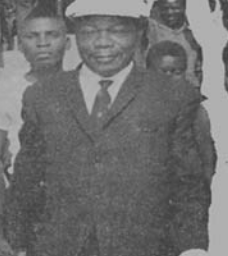Related Research Articles

Kenneth Kaunda, also known as KK, was a Zambian politician who served as the first president of Zambia from 1964 to 1991. He was at the forefront of the struggle for independence from British rule. Dissatisfied with Harry Nkumbula's leadership of the Northern Rhodesian African National Congress, he broke away and founded the Zambian African National Congress, later becoming the head of the socialist United National Independence Party (UNIP).

The politics of Zambia takes place in a framework of a presidential representative democratic republic, whereby the president of Zambia is head of state, head of government and leader of a multi-party system. Executive power is exercised by the government, while legislative power is vested in both the government and parliament. Formerly Northern Rhodesia, Zambia became a republic immediately upon attaining independence in October 1964.
Alice Lenshina (1920–1978) was a Zambian woman, prisoner of conscience and self-appointed "prophetess" who is noted for her part in the "Lumpa Uprising", which claimed 700 lives.

Harry Mwaanga Nkumbula was a Zambian nationalist leader involved in the movement for the independence of Northern Rhodesia, as Zambia was known until the end of British rule in 1964. He was born in the village of Maala in the Namwala district of Zambia's southern province. He was the youngest of three children and the only son.
Simon Mwansa Kapwepwe was a prominent Zambian politician, anti-colonialist, and author, born on April 12, 1922. Kapwepwe made significant contributions towards Zambia's struggle for independence, working tirelessly towards achieving the country's liberation from colonial rule.

Rupiah Bwezani Banda was a Zambian politician who served as the fourth president of Zambia from 2008 to 2011, taking over from Levy Mwanawasa. Banda was an active participant in politics from early in the presidency of Kenneth Kaunda, during which time he held several diplomatic posts.
Prostitution in Zambia is legal and common. Related activities such as soliciting and procuring are prohibited. UNAIDS estimate there are 9,285 prostitutes in the capital, Lusaka. Many women turn to prostitution due to poverty. Sex workers report law enforcement is corrupt, inconsistent and often abusive.

Presidential elections were held in Zambia on 30 October 2008 following the death of the incumbent President Levy Mwanawasa on 19 August 2008, as the elections had to be called within 90 days of his death. It was expected that there would be internal problems within the ruling Movement for Multi-Party Democracy (MMD) as Mwanawasa had not declared a successor prior to his death, but Acting President Rupiah Banda was selected as the MMD's candidate without apparent problems. Michael Sata stood as the candidate of the Patriotic Front (PF), while Hakainde Hichilema stood as the candidate of the United Party for National Development (UPND). Godfrey Miyanda stood as the candidate of the Heritage Party.
Jethro Mukenge Mutti, was a Zambian politician who between the years 1964 to 1975 served as member of parliament, Ambassador, Minister and Member of the Central Committee under the ruling party UNIP led by Kenneth Kaunda. He died on 18 January 2013 after complications from aspiration pneumonia following a series of mini strokes and poor health in the last few years of his life, linked to his tetraplegic condition.

Beatrice "Betty" Kaunda was a Zambian educator and inaugural First Lady of Zambia from 1964 to 1991 as the wife of the country's first president, Kenneth Kaunda. She was known as Mama Betty Kaunda and the Mother of Zambia by Zambians.
Victoria Kalima Phiri was a Zambian politician who was Minister of Gender and member of the National Assembly for Kasenengwa from 2016 and 2011, respectively, till her death.
Sikota Wina was a Zambian politician. He was a member of the Legislative Council and the National Assembly and the country's first Minister of Health. He also held the posts of Minister for Local Government and Minister of Information, Broadcasting and Tourism.
Lucy Banda-Sichone (1954–1998) was a Zambian civil rights activist who played a pivotal role in representing the Zambian people who had their rights violated by the State at the time. Born and raised in Zambia's second largest city, Kitwe, she became the first Zambian woman to receive a Rhodes Scholarship and also the first woman to have her portrait displayed on the walls of Oxford University's prestigious Rhodes House.
Senior Chieftainess Nkomeshya Mukamambo II is the chieftainship of the Soli people of Chongwe District in Lusaka Province. She has been a chieftainess in the area since 1976. She is the second female Nkomeshya since 19th century Mukamambo I who is mythologized as having spiritual powers that allowed her to change her physical form and veil her people to protect them from enemies.
Nakatindi Yeta Nganga (1922–1972) was a Lozi aristocrat and Zambian politician. Jointly one of the first women elected to the National Assembly, she was also the country's first female junior minister.
Dora Siliya is a politician in Zambia. She is the former member of parliament for Petauke Central and the former Minister of Communication and Broadcasting.
Mavis Lengalenga Muyunda was a Zambian politician.
Monica Nanyangwe Chintu was a Zambian politician, one of Zambia's first female politicians.
Florence Mophosho was a South African politician and anti-apartheid activist of the African National Congress (ANC). A stalwart of the ANC Women's League, she was a member of the ANC National Executive Committee from 1975 until her death in 1985.
References
- 1 2 3 4 5 "Freedom Fighter and Politician Mama Chibesa Kankasa has died". Lusaka Times. 29 October 2018.
- 1 2 3 4 5 6 Jack Zimba. "Kankasa: Remembering the 'National Cook'". Zambia Daily Mail .
- ↑ "Late Chibesa Kankasa accorded State Funeral". Lusaka Times. 30 October 2018.